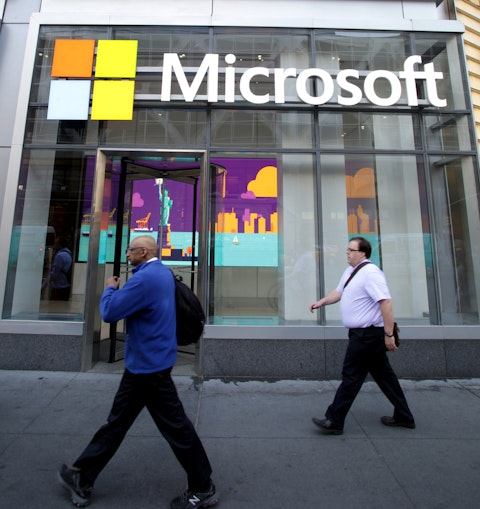In this article, we will go over the definition of a monopoly and take a look at the 12 near-monopoly stocks in the US. If you want to see more stocks in this selection, go to the 5 Near Monopoly Stocks in the US.
A monopoly is characterized by a single seller holding sway over a market, offering a singular product. In its truest sense, a monopoly commands a 100% market share. Many sectors are governed by key players with substantial market dominance. These companies benefit from economies of scale and erect barriers to entry, thwarting potential newcomers from challenging their dominance. In our previous examination of near-monopoly stocks, we referenced Warren Buffett‘s 2011 testimony before the US Congress, in which he highlighted pricing power as a crucial factor in assessing a business. Buffett, one of the most renowned investors globally, has amassed billions through his publicly traded holding company, Berkshire Hathaway Inc. (NYSE:BRK-B). With an impressive investment history and personal wealth, Buffett has sought out consumer monopolies whose products possess unique qualities such as patents, brand names, or other intangibles that effectively deter competition.
It’s worth noting that Apple Inc (NASDAQ:AAPL) holds the largest position in Berkshire Hathaway’s portfolio, valued at over $174.34 billion as of Q4 2023. The tech giant’s dominance extends to several industries, either through outright monopoly or near-monopoly positions. Additionally, American Express Company (NYSE:AXP) ranks as the third-largest investment in Warren Buffett’s portfolio. Headquartered in New York, the company offers credit and debit card services, alongside Visa, Inc. (NYSE:V) and Mastercard Incorporated (NYSE:MA).
Overall, the financial media has been abuzz with discussions about the significant portion of the stock market surge in 2023 attributed to only seven companies, nicknamed the “Magnificent 7.” These select companies represent over 30% of the total value of the S&P 500, despite making up just 1.6% of the index, and contributed over 60% to the overall market gain in 2023. Excluding them, the stock market’s increase last year would have been a modest 9% after adjusting for inflation. When examining profits, it’s evident why. According to Deutsche Bank macro strategist Jim Reid, the Magnificent 7 generates approximately $361 billion annually. This amount is comparable to the combined profits of all companies in Japan and notably surpasses the total profits of all listed companies in the UK, which roughly amount to $217 billion.
In theory, a monopoly might not seem problematic, but by definition, it could harm consumers if not closely regulated. Without competition, monopolies may charge excessive prices, offer subpar products, and limit choices to maximize their profits. While not outright banned by law, various regulations exist to ensure monopolies engage in fair practices. The Sherman Antitrust Act, for example, is a key legislation used to break up companies that stifle competition and prevent mergers that could create virtual monopolies. Another example comes in the form of lawsuits, whereby which governments aim to prevent anticompetitive practices in a market. The most recent one involved the US Department of Justice and Apple Inc. (NASDAQ:AAPL). Earlier in March, the Justice Department, alongside over a dozen state attorneys general, lodged a lawsuit in the US District Court in New Jersey targeting the tech behemoth. Alleging anticompetitive behavior in the smartphone market, this move signifies another step in the Biden Administration’s campaign to rein in the influence of Big Tech, and follows previous antitrust actions directed at Alphabet Inc. (NASDAQ:GOOG)’s Google, Amazon.com, Inc. (NASDAQ:AMZN), and Meta Platforms, Inc. (NASDAQ:META).
However, despite these regulations potentially limiting profits, investors often find monopolistic stocks attractive. The significant market share held by monopolies can contribute to long-term growth and value, offsetting some of the inherent risks associated with investing in any security. Market leaders like Alphabet Inc. (NASDAQ:GOOG), Microsoft Corporation (NASDAQ:MSFT), and Amazon.com, Inc. (NASDAQ:AMZN) that have solidified their position by dominating a sector and securing a significant market share are often considered among the best near monopoly stocks in their respective industries.

Northfoto / Shutterstock.com
Our Methodology
For this list, we’ve pinpointed 12 US stocks that demonstrate near-monopoly characteristics, largely driven by their significant market share. Many of these companies belong to the FAANG cohort, comprising major players in the technology sphere. These tech giants dominate various sectors, including cloud computing, e-commerce, mobile applications, operating systems, search engines, social media, and web browsers. Additionally, other stocks in our selection command near-monopoly positions in diverse sectors like alcoholic beverages, personal credit rating, and satellite radio. Our rankings are based on the number of hedge funds holding stakes in these stocks as of Q4 2023.
12. Pearson plc (NYSE:PSO)
Number of Hedge Fund Holders: 10
Pearson plc (NYSE:PSO) is a British multinational publishing and education enterprise headquartered in London. Originally founded as a construction venture in the 1840s, it shifted its focus to publishing during the 1920s. It holds the distinction of being the foremost global publisher of educational materials and textbooks. The company garners about two-thirds of its revenue and profit from the US market, solidifying its dominance with a market share surpassing 40% in assessment, publishing, and online program management.
By the close of Q4 2023, Insider Monkey’s database recorded the involvement of 10 hedge funds holding stakes in Pearson plc (NYSE:PSO), marking a slight uptick from the previous quarter. The combined value of these stakes exceeds $25.9 million.
Much like Alphabet Inc. (NASDAQ:GOOG), Microsoft Corporation (NASDAQ:MSFT), and Amazon.com, Inc. (NASDAQ:AMZN), Pearson plc (NYSE:PSO) operates as one of the best near monopoly stocks in the US.
11. Sirius XM Holdings Inc. (NASDAQ:SIRI)
Number of Hedge Fund Holders: 22
Based in Midtown Manhattan, New York City, Sirius XM Holdings Inc. (NASDAQ:SIRI) is a broadcasting corporation dominating the satellite radio market in the United States. In a strategic move to counter Pandora’s competitive endeavors, Sirius XM Holdings Inc. (NASDAQ:SIRI) acquired Pandora for $3.5 billion in July 2021.
On March 27, Benchmark Co. analyst Matthew Harrigan adjusted the price target from $7 to $6.50 while maintaining a Buy rating for Sirius XM Holdings Inc. (NASDAQ:SIRI).
In the fourth quarter of 2023, Sirius XM Holdings Inc. (NASDAQ:SIRI) featured in the portfolios of 22 hedge funds, with a combined stake value of $345.503 million. This marks a decrease from the involvement of 24 funds in the previous quarter, where stakes amounted to $146.375 million. Berkshire Hathaway, led by Warren Buffett, notably increased its stake in the company by 316% to 40.243 million shares valued at $220.13 million, making it the foremost shareholder as of December 31.
10. Anheuser-Busch InBev SA/NV (NYSE:BUD)
Number of Hedge Fund Holders: 24
Based in St. Louis, Missouri, Anheuser-Busch InBev SA/NV (NYSE:BUD) stands as the largest brewing company globally. It boasts a portfolio of renowned brands such as Budweiser, Michelob, Stella Artois, and Beck’s. With a reported revenue of $59.38 billion and a net income of $5.34 billion last year, it holds the title of the Largest Beer Company by Revenue.
As of the fourth quarter of 2023, the Bill & Melinda Gates Foundation Trust emerged as one of the significant shareholders in Anheuser-Busch InBev SA/NV (NYSE:BUD), holding 1.7 million shares valued at around $110 million. In total, 24 hedge funds disclosed holdings in the company by the end of the quarter.
9. Altria Group, Inc. (NYSE:MO)
Number of Hedge Fund Holders: 42
Altria Group, Inc. (NYSE:MO) is a prominent American corporation headquartered in Henrico County, Virginia, known for its significant role in the global tobacco and cigarette industry. It stands as a leading manufacturer and promoter of tobacco-related products worldwide. Altria Group, Inc. (NYSE:MO) operates as the parent company for several subsidiaries, including Philip Morris USA, John Middleton, Inc., U.S. Smokeless Tobacco Company, Inc., and Philip Morris Capital Corporation. Moreover, it holds noteworthy minority stakes in AB InBev, a Belgian brewer, and Cronos Group, a Canadian cannabis company.
By the conclusion of the fourth quarter of 2023, Insider Monkey’s database revealed that 42 hedge funds held stakes in Altria Group, Inc. (NYSE:MO), collectively valued at $1 billion. This marked an increase from the preceding quarter, where 40 hedge funds held stakes valued at $565 million.
Andvari Associates stated the following regarding Altria Group, Inc. (NYSE:MO) in its first quarter 2024 investor letter:
“Our second example of a high-yielding security is the stock of Altria Group, Inc. (NYSE:MO). Before we get into the details of why we started a position in Altria, a brief history is in order. The company was formerly known as Philip Morris before rebranding to Altria in 2003. Cynically, the rebranding was to minimize the negative attention from its tobacco business. However, the company also owned Kraft Foods and Miller Brewing, so it was logical to reflect its status as a conglomerate. Since rebranding, Altria has slowly “de-conglomerated”. It spun out Kraft in 2007. It spun out Philip Morris International in 2008. In 2021, it sold its Ste. Michelle Wine Estates business. Finally, last month Altria announced it is selling part of its 10% ownership in Anheuser-Busch InBev (BUD)
Andvari has followed Altria since we began our investment career. Profitability is extraordinary and the business requires minimal capital expenditures. Despite the volume of cigarettes having steadily declined—a great thing for our population health—Altria has still managed to grow revenues and profits with regular price increases…” (Click here to read the full text)
8. Waste Management, Inc. (NYSE:WM)
Number of Hedge Fund Holders: 45
Waste Management, Inc. (NYSE:WM), known as WM, is a leading waste management and environmental services company in North America. Established in 1968 and headquartered in Houston, Texas, it operates from the Bank of America Tower. With a significant market share exceeding 50% compared to its competitors, Waste Management is a key player in the waste collection industry.
Jefferies analysts maintained a Buy rating and set a price target of $256 for Waste Management, Inc. (NYSE:WM) on March 18.
In the fourth quarter, a total of 45 hedge funds held long positions in Waste Management, Inc. (NYSE:WM), collectively representing a stake value of $7.3 billion.
7. Fair Isaac Corporation (NYSE:FICO)
Number of Hedge Fund Holders: 49
At the end of the fourth quarter of 2023, 49 hedge funds in the database of Insider Monkey held stakes worth $3 billion in Fair Isaac Corporation (NYSE:FICO), compared to 44 in the preceding quarter worth $2 billion.
In its Q4 2023 investor letter, Conestoga Capital Advisors, an asset management firm, highlighted a few stocks and Fair Isaac Corporation (NYSE:FICO) was one of them. Here is what the fund said:
“Fair Isaac Corporation (NYSE:FICO): FICO is a leader in predictive analytics and decision management software and is also the provider of FICO credit scores. FICO reported solid 4Q results, with revenue beating expectations, partially mitigated by a slight shortfall in EPS. Total revenue sustained low-double-digit growth in the quarter, with Scores up 12% year-over-year and Software up 11%. Software annual recurring revenue growth accelerated to 22% year-over-year in 4Q from 20% in 3Q. FICO also guided to double-digit revenue and EPS growth in fiscal year 2024.”
6. Apple Inc. (NASDAQ:AAPL)
Number of Hedge Fund Holders: 131
Based in California, Apple Inc. (NASDAQ:AAPL) operates as a diversified technology company and currently holds the title of the world’s largest company by market capitalization. Renowned for its near-monopoly status in mobile application stores and mobile operating systems, Apple Inc. (NASDAQ:AAPL) also asserts significant dominance in the web browser segment, positioning itself among other major tech giants.
On March 5, investment advisory firm Wedbush maintained an Outperform rating on Apple Inc. (NASDAQ:AAPL) stock, setting a price target of $250.
As of the fourth quarter of 2023, Insider Monkey’s database revealed that 131 hedge funds held stakes in Apple Inc. (NASDAQ:AAPL), collectively valued at $205 billion. This represented a slight decrease from the previous quarter, where 134 hedge funds held stakes valued at $179 billion.
The very definition of what a near-monopoly looks like, Apple Inc. (NASDAQ:AAPL) joins the ranks of Alphabet Inc. (NASDAQ:GOOG), Microsoft Corporation (NASDAQ:MSFT), and Amazon.com, Inc. (NASDAQ:AMZN), as one of the best near monopoly stocks in the US.
Click to continue reading and see 5 Near Monopoly Stocks in the US.
Suggested articles:
- 15 Best Gambling Stocks to Buy Now
- 10 Undervalued Stocks with Latest Insider Purchases
- 13 Best Reddit Stocks to Buy Now
Disclosure: None. Monopoly Definition and 12 Near Monopoly Stocks in the US is originally published at Insider Monkey.





